This article will take you through the definition of research hypothesis, and provides you with detailed step-by-step guide that would help you write a research hypothesis based on your research question.
A hypothesis is a proposed explanation for a phenomenon. A research hypothesis is a statement of expectation or prediction that will be tested by research.
Before formulating a hypothesis, it is important to carefully read the literature and take notes. After narrowing your focus to a specific problem area, you can formulate several research hypotheses based on what is already known about the topic.
What is Hypothesis?
A hypothesis ought to be supported by theories and data that are already known. It must also be testable, which implies that you can confirm or disprove it using techniques from scientific research methods, such as observations, experiments, and statistical data analysis.
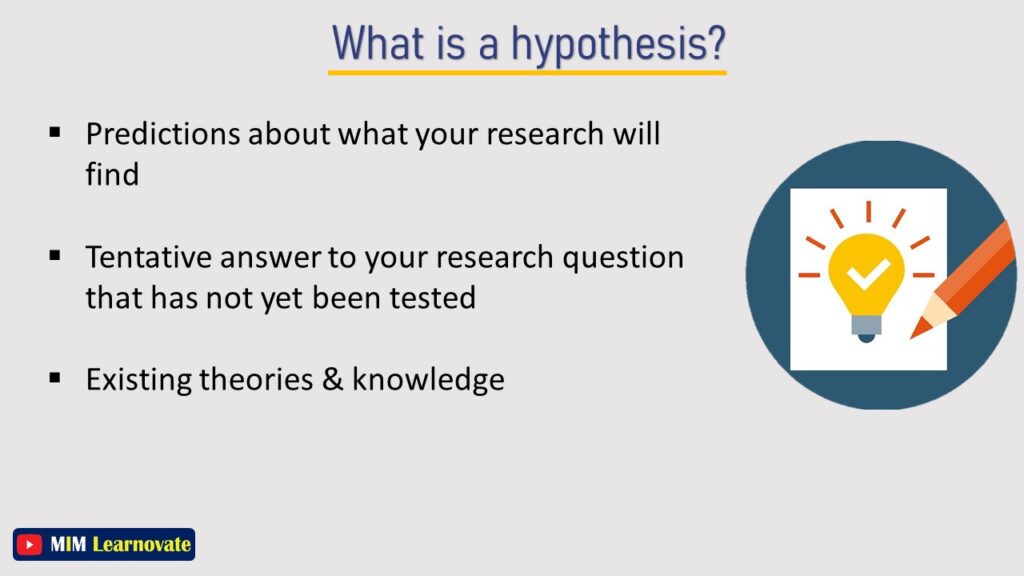
- A hypothesis outlines your predictions for the results of your research.
- It is a provisional solution to your research question that hasn’t been put to the test.
- A hypothesis is a proposed explanation for a phenomenon.
- A good hypothesis is based on knowledge and observation.
A hypothesis is a guess or prediction about how something works. In science, a hypothesis is an idea that can be tested through research.
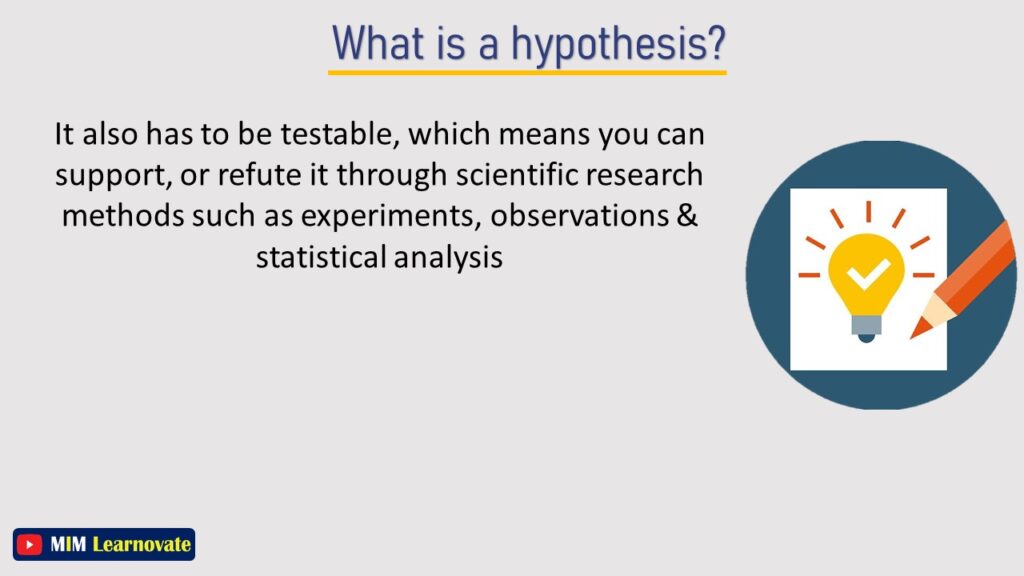
Scientific Hypothesis
For a hypothesis to be a scientific hypothesis, the scientific method requires that one can test it. Scientists generally base scientific hypotheses on previous observations that cannot be explained by the current scientific theory.
- A scientific hypothesis must be testable. This means that it can be measured and repeated.
- Must be falsifiable, which means that it can be proven wrong.
- Starts with a question.
If a hypothesis cannot be tested or proven wrong, it is not scientific.
Example
Why do leaves change color in the fall?
A scientist may have an idea, or hunch, about how something works. To test this idea, the scientist makes predictions, that is develop hypotheses, about what will happen during an experiment.
Steps for Developing Research hypothesis
A hypothesis is an educated guess as to the outcome of a research problem. The development of a hypothesis requires critical thinking and should be based on both previous research and observation.
Here are the steps in developing a hypothesis:
1. Identify the problem or question that you want to answer
2. Review the literature related to your problem or question
3. Formulate your hypothesis
4. Refine your hypothesis
5. Phrase your hypothesis
Step 1: Ask a Question
Identify the problem or question that you want to answer.
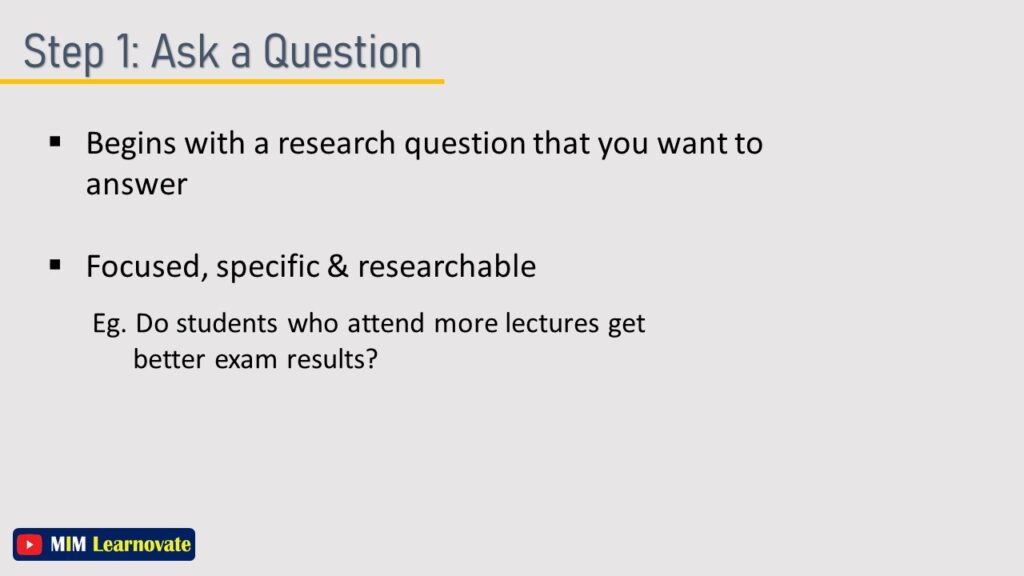
Choose a topic that interests you. The best hypotheses come from topics that you’re passionate about.
The process of creating a hypothesis starts with a research question that you hope to address. Within the parameters of your study, the question should be focused, precise, and researchable. Consider this example:
Do students who attend more lectures perform better on exams?
Step 2: Do some preliminary research
Review the literature related to your problem or question.
Do some background research. Once you’ve chosen your topic, it’s important to conduct preliminary research so that you have a better understanding of the issue at hand.
Your initial response should be predicated on what is currently known about the subject. To make informed assumptions regarding the results of your research, look for theories and earlier studies.
You may create a conceptual framework at this point to specify the variables you’ll be examining and the connections you believe exist between them.
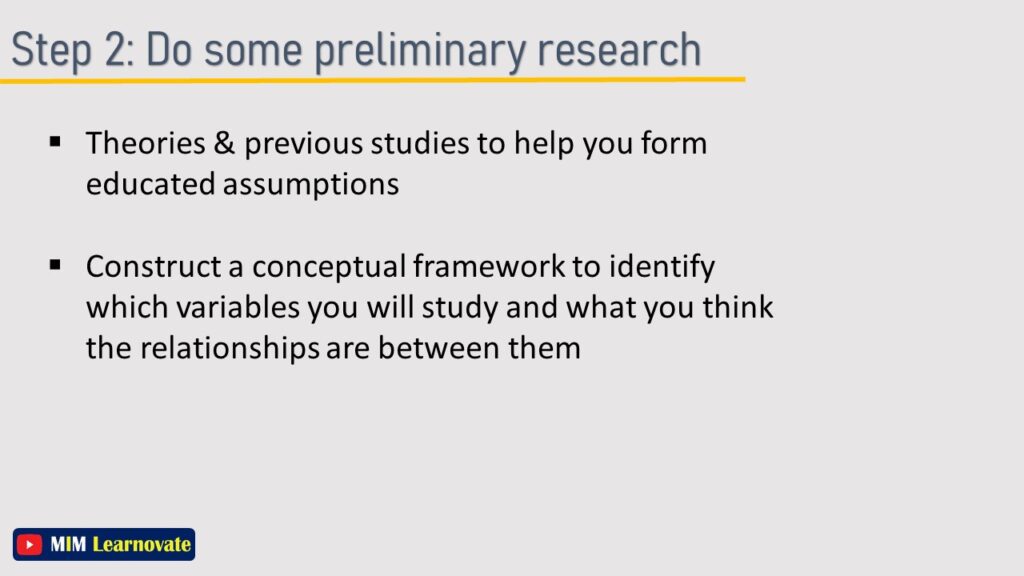
Step 3: Formulate your hypothesis
After you know what to expect, you can start looking. Your initial response should be expressed in one clear, concise sentence.
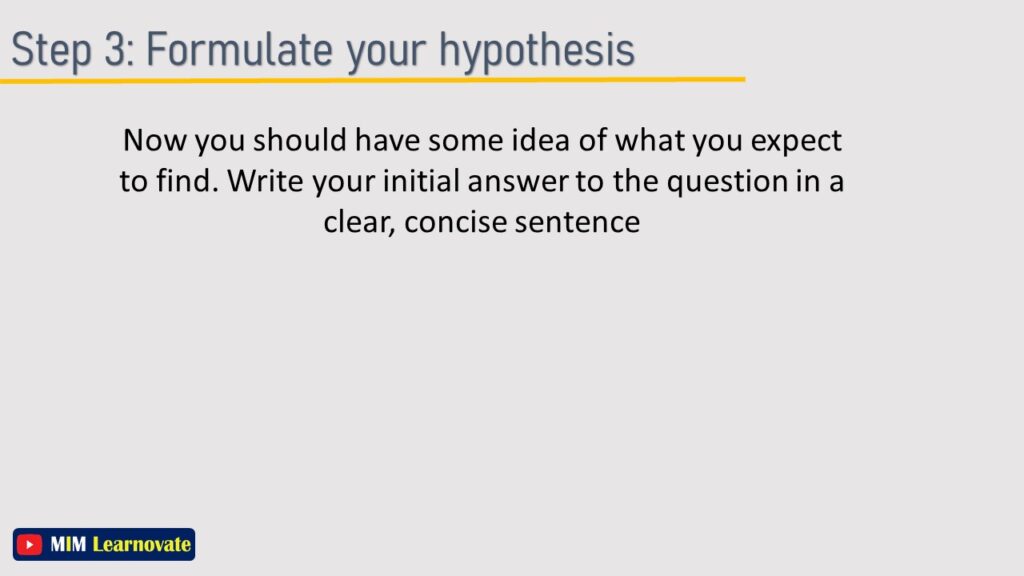
Step 4: Refine your hypothesis
Make sure your hypothesis can be tested and is specific.
There are many ways to phrase a hypothesis, but each term you use should have a clear explanation, and the hypothesis itself should include all necessary variables, the particular group being examined, and the anticipated result of the experiment or analysis.
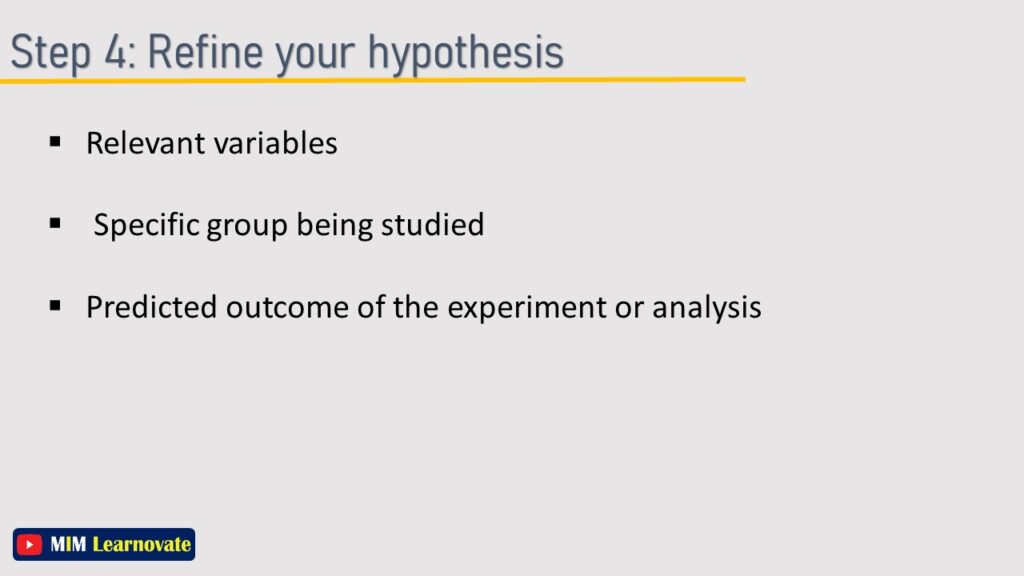
Step 5: Phrase your hypothesis in three ways
You can create a straightforward if…then prediction to pinpoint the factors.
The independent variable is stated in the first portion of the statement, while the dependent variable is stated in the second.
Example of an if-then
If a graduate student starts attending more lectures, then their exam scores will improve
In academic research, it is more typical to express hypotheses in terms of correlations or effects, where you explicitly indicate the expected link between variables.
Consider this example:
The number of lectures, attended by graduate students, has a positive effect, on their exam scores.
If you are comparing two groups, your hypothesis can describe the difference you foresee between the groups to be.
Graduate students who attended the majority of lectures will perform better on exams than those who did not.
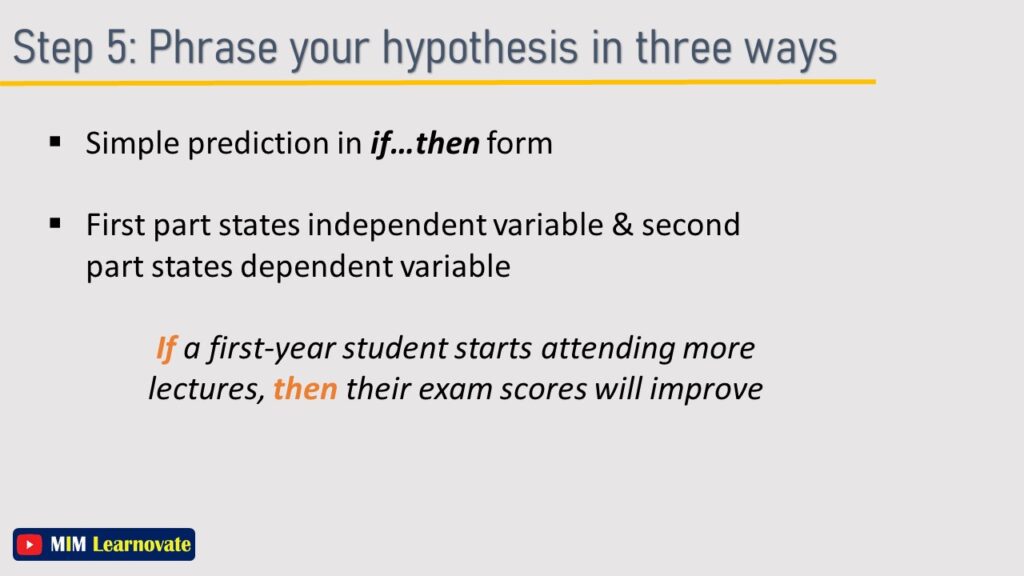
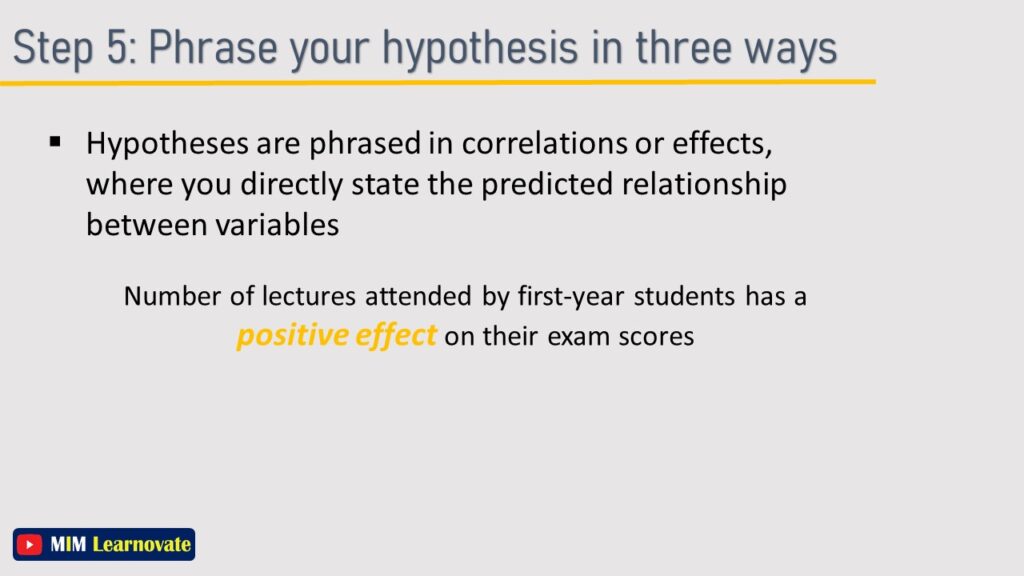
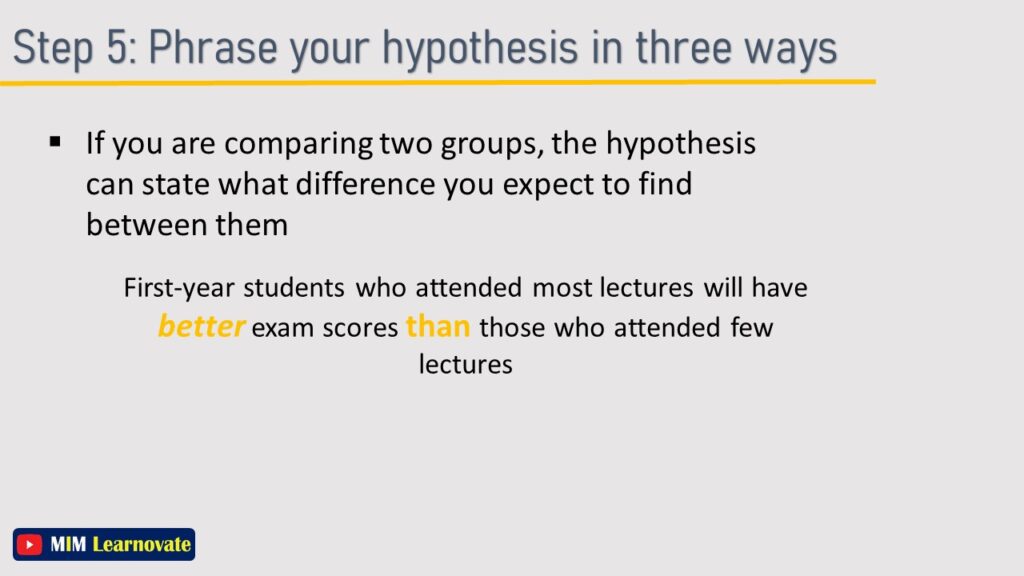
Null hypothesis
Consider submitting a null hypothesis if your research incorporates statistical hypothesis testing. The default assumption under the null hypothesis is that there is no correlation between the variables.
The alternative hypothesis, often known as HA, is written as H1, while the null hypothesis is represented as H 0.
The number of lectures graduate students attend has no bearing on how well they perform on their final exams, as an example of the null hypothesis, H O.
The amount of lectures graduate students attend has a beneficial impact on their final exam grades, as an example of an alternate hypothesis, H1.
Examples of hypothesis
| Research Questions | Hypothesis | Null hypothesis |
|---|---|---|
| What are the health benefits of eating an apple a day? | Increasing apple consumption in over-60s will result in decreasing frequency of doctor’s visits | Increasing apple consumption in over-60s will have no effect on frequency of doctor’s visits |
| What effect does daily use of social media have on the attention span of under-16s? | There is a negative correlation between time spent on social media and attention span in under-16s | There is no relationship between social media use and attention span in under-16s |
| Which airlines have the most delays? | Low-cost airlines are more likely to have delays than premium airlines | Low-cost and premium airlines are equally likely to have delays |
| Can flexible work arrangements improve job satisfaction? | Employees who have flexible working hours will report greater job satisfaction than employees who work fixed hours | There is no relationship between working hour flexibility and job satisfaction |
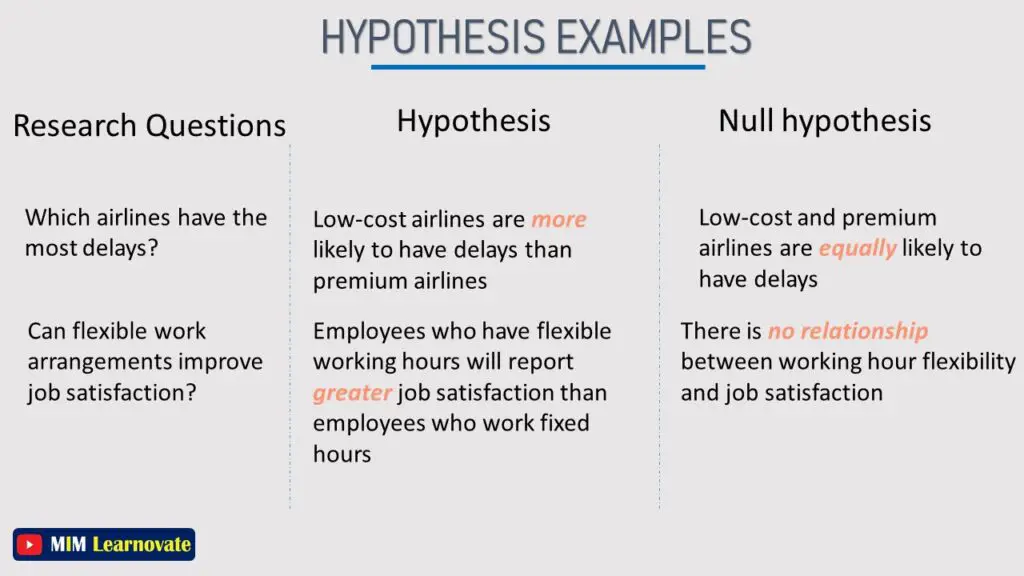
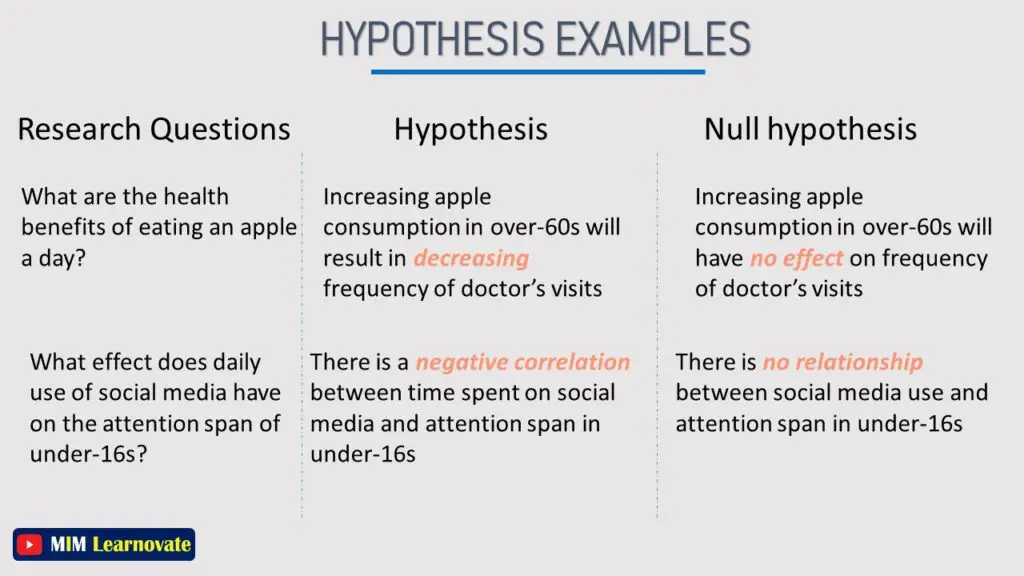
Characteristics of a Hypothesis:
A good hypothesis is a testable statement that predicts the results of an experiment. It is important to remember that hypotheses are not facts; they are educated guesses based on previous research.
The following are the characteristics of a good hypothesis:
1. A good hypothesis must be testable. This means that it can be measured and observed.
2. A good hypothesis should be specific and clear. This makes it easy to design an experiment to test the hypothesis.
3. A good hypothesis should be based on previous research. This gives the hypothesis credibility and increases the chances of it being correct.
4. A good hypothesis must be falsifiable, which means that it can be proven wrong if the results of the experiment do not support it.
5. A good hypothesis should be logical and make sense based on what is already known about the topic.
It is important to remember that not all hypotheses are correct; however, a well-crafted hypothesis can be an important tool for scientific research.
Importance of Research Hypothesis
A research hypothesis is a statement of what the researcher expects to find in a study. It is typically based on previous research and states a relationship between two or more variables.
The hypothesis is important because it guides the direction of the research and helps to focus the analysis. Without a hypothesis, it would be difficult to know what to look for in the data and how to interpret the results.
A well-written hypothesis will help to ensure that the research is rigorous and that the data are interpreted correctly.
It is also important to remember that the hypothesis should be testable; otherwise, there is no way to determine whether or not the results support the original idea.
Checklist for Developing a Hypothesis
A hypothesis is a proposed explanation for a phenomenon. For a research project, developing a good hypothesis is an essential first step. Undermentioned checklist can help you create a strong hypothesis for your project:
1. Make sure your hypothesis is testable. It should be possible to design an experiment or study that will allow you to test whether your hypothesis is correct.
2. Ensure that your hypothesis is specific and clearly defined. This will make it easier to test and also make the results of your research more interpretable.
3. Avoid making assumptions that cannot be tested. For example, do not assume that one variable causes another without any evidence to support this claim.
4. Make sure your hypothesis is based on existing knowledge and research in the field.
Conclusion
Overall, the research hypothesis plays an essential role in conducting high-quality research. By articulating a clear and testable idea, the researcher can focus their efforts and increase the chances of finding meaningful results.
By the end of this article you have learnt what research hypothesis, and you have learned step-by-step guide that would help you write a research hypothesis based on your research question.
Other articles
Please read through some of our other articles with examples and explanations if you’d like to learn more about research methodology.
Citation Styles
- APA Reference Page
- MLA Citations
- Chicago Style Format
- “et al.” in APA, MLA, and Chicago Style
- Do All References in a Reference List Need to Be Cited in Text?
Comparision
- Basic and Applied Research
- Cross-Sectional vs Longitudinal Studies
- Survey vs Questionnaire
- Open Ended vs Closed Ended Questions
- Experimental and Non-Experimental Research
- Inductive vs Deductive Approach
- Null and Alternative Hypothesis
- Reliability vs Validity
- Population vs Sample
- Conceptual Framework and Theoretical Framework
- Bibliography and Reference
- Stratified vs Cluster Sampling
- Sampling Error vs Sampling Bias
- Internal Validity vs External Validity
- Full-Scale, Laboratory-Scale and Pilot-Scale Studies
- Plagiarism and Paraphrasing
- Research Methodology Vs. Research Method
- Mediator and Moderator
- Type I vs Type II error
- Descriptive and Inferential Statistics
- Microsoft Excel and SPSS
- Parametric and Non-Parametric Test
Comparision
- Independent vs. Dependent Variable
- Research Article and Research Paper
- Proposition and Hypothesis
- Principal Component Analysis and Partial Least Squares
- Academic Research vs Industry Research
- Clinical Research vs Lab Research
- Research Lab and Hospital Lab
- Thesis Statement and Research Question
- Quantitative Researchers vs. Quantitative Traders
- Premise, Hypothesis and Supposition
- Survey Vs Experiment
- Hypothesis and Theory
- Independent vs. Dependent Variable
- APA vs. MLA
- Ghost Authorship vs. Gift Authorship
Research
- Research Methods
- Quantitative Research
- Qualitative Research
- Case Study Research
- Survey Research
- Conclusive Research
- Descriptive Research
- Cross-Sectional Research
- Theoretical Framework
- Conceptual Framework
- Triangulation
- Grounded Theory
- Quasi-Experimental Design
- Mixed Method
- Correlational Research
- Randomized Controlled Trial
- Stratified Sampling
- Ethnography
- Ghost Authorship
- Secondary Data Collection
- Primary Data Collection
- Ex-Post-Facto
Research
- Table of Contents
- Dissertation Topic
- Synopsis
- Thesis Statement
- Research Proposal
- Research Questions
- Research Problem
- Research Gap
- Types of Research Gaps
- Variables
- Operationalization of Variables
- Literature Review
- Research Hypothesis
- Questionnaire
- Abstract
- Validity
- Reliability
- Measurement of Scale
- Sampling Techniques
- Acknowledgements
Statistics
- PLS-SEM model
- Principal Components Analysis
- Multivariate Analysis
- Friedman Test
- Chi-Square Test (Χ²)
- T-test
- SPSS
- Effect Size
- Critical Values in Statistics
- Statistical Analysis
- Calculate the Sample Size for Randomized Controlled Trials
- Covariate in Statistics
- Avoid Common Mistakes in Statistics
- Standard Deviation
- Derivatives & Formulas
- Build a PLS-SEM model using AMOS
- Principal Components Analysis using SPSS
- Statistical Tools
- Type I vs Type II error
- Descriptive and Inferential Statistics
- Microsoft Excel and SPSS
- One-tailed and Two-tailed Test
- Parametric and Non-Parametric Test




10 Comments
I think you have noted some very interesting details , thanks for the post.
I’m really enjoying the design and layout of your blog. It’s a very easy on the eyes which makes it much more enjoyable for me to come here and visit more often. Did you hire out a designer to create your theme? Fantastic work!
Great line up. We will be linking to this great article on our site. Keep up the good writing.
When I originally commented I clicked the -Notify me when new comments are added- checkbox and now each time a remark is added I get 4 emails with the identical comment. Is there any approach you may take away me from that service? Thanks!
To the mimlearnovate.com owner, You always provide great examples and case studies.
Thankyou for helping out, excellent information.
Hi mimlearnovate.com owner, Keep sharing your knowledge!
Wow, awesome blog layout! How long have you been blogging for? you made blogging look easy. The overall look of your web site is excellent, as well as the content!
I have read a few excellent stuff here. Definitely worth bookmarking for revisiting. I wonder how much attempt you set to make this sort of wonderful informative website.
Hi there, You’ve done an excellent job. I’ll certainly digg it and personally suggest to my friends. I am sure they will be benefited from this site.